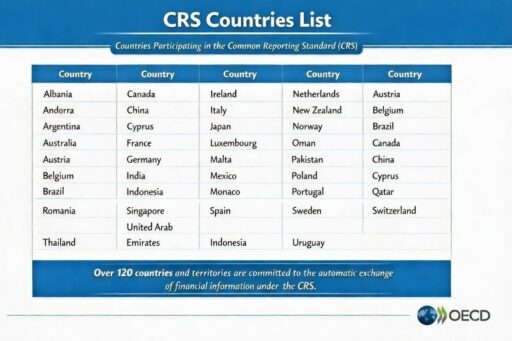Non-CRS countries, like the United States, are jurisdictions that have not adopted the Common Reporting Standard, meaning they don’t automatically share financial account data with other tax authorities.
As of 2025, only a limited number of nations remain outside the CRS framework, offering varying degrees of banking privacy and strategic advantages for global investors.
This article covers:
- What is a non-CRS country?
- What is a non-participating jurisdiction under CRS?
- Does CRS include the USA?
- What is the difference between FATCA and CRS?
- What countries are included in the CRS?
Key Takeaways:
- Non-CRS countries haven’t fully adopted the Common Reporting Standard (CRS)
- More than 120 jurisdictions participate in CRS, but a limited number remain outside it
- The United States is not part of CRS; instead it uses FATCA.
- Being non-CRS doesn’t guarantee no information exchange.
My contact details are hello@adamfayed.com and WhatsApp +44-7393-450-837 if you have any questions.
The information in this article is for general guidance only. It does not constitute financial, legal, or tax advice, and is not a recommendation or solicitation to invest. Some facts may have changed since the time of writing.

What does non-CRS mean?
The term non-CRS refers to jurisdictions that have not committed to, or have not yet fully implemented, the automatic exchange of financial account information under the Common Reporting Standard (CRS).
In practical terms, a non-CRS country is one where banks or financial institutions may not be obligated (or yet operational) to report account-holders’ details automatically to other tax authorities under the CRS framework.
However, non-CRS does not guarantee no reporting whatsoever, nor does it replace other obligations such as local tax residency disclosure, bilateral exchange agreements, or other regimes like the Foreign Account Tax Compliance Act (FATCA) for US persons.
The concept is part of a broader shift in global tax transparency that affects cross-border wealth planning.
What is the main objective of CRS?
The primary goal of the CRS is to combat offshore tax evasion by enabling tax authorities to receive information about financial accounts held by residents of other jurisdictions.
In essence, financial institutions (banks, investment funds, custodians) must identify accounts held by non-residents, collect certain data (account balance, interest, dividends, etc), and transmit that to the local tax authority.
That tax authority then exchanges the data with the tax authority of the account-holder’s jurisdiction of tax residence.
For global-mobile high-net-worth individuals and expats, the CRS framework means that simply having an account in a jurisdiction different to your tax residence may trigger disclosure to your tax home.
The CRS is about tax residency, not citizenship (unlike FATCA which revolves around US citizenship).
For an expat or high-net-worth individual that means you need a robust cross-border tax strategy to ensure you’re compliant, even in friendly jurisdictions.
What countries are excluded from the CRS list?
International Finance Bank lists about 100 jurisdictions non-participating in both FATCA & CRS and highlights that the United States is not a CRS participant because it uses the FATCA regime instead.
According to the Organisation for Economic Co‑operation and Development and individual tax authorities, as of 2025 over 120 jurisdictions have committed to CRS.
In practical terms for expats and high-net-worth individuals this means there is a significant number of jurisdictions that still appear to not participate in CRS or have not yet implemented reporting under CRS.
Here’s the full list of FATCA & OECD CRS non-reporting countries according to IFB:
- Comoros
- Dominican Republic
- Armenia
- Botswana
- Guatemala
- Cambodia
- North Macedonia
- Philippines
- Bahrain
- Afghanistan
- Algeria
- Angola
- Antigua and Barbuda
- Bangladesh
- Barbados
- Belize
- Benin
- Burkina Faso
- Burundi
- Cameroon
- Central African Republic
- Chad
- Congo (Democratic Republic)
- Congo (Republic)
- Côte d’Ivoire
- Djibouti
- Dominica
- Egypt
- El Salvador
- Equatorial Guinea
- Eritrea
- Eswatini
- Ethiopia
- Fiji
- Gabon
- Gambia
- Ghana
- Grenada
- Guinea
- Guinea-Bissau
- Guyana
- Haiti
- Honduras
- Iraq
- Jordan
- Kiribati
- Kosovo
- Kuwait
- Kyrgyzstan
- Laos
- Lebanon
- Lesotho
- Liberia
- Libya
- Madagascar
- Malawi
- Maldives
- Mali
- Mauritania
- Micronesia
- Mongolia (joining CRS in 2026)
- Morocco (joining CRS in 2025)
- Mozambique
- Myanmar
- Namibia
- Nepal
- Nicaragua
- Niger
- North Korea
- Palau
- Papua New Guinea (joining CRS in 2027)
- Paraguay
- Rwanda (joining CRS in 2025)
- Samoa
- São Tomé and Príncipe
- Senegal (joining CRS in 2025)
- Serbia
- Sierra Leone
- Solomon Islands
- Somalia
- South Sudan
- Sri Lanka
- Sudan
- Suriname
- Syria
- Tajikistan
- Tanzania
- Timor Leste
- Togo
- Tonga
- Tunisia (joining CRS in 2025)
- Turkmenistan
- Tuvalu
- Uganda (joining CRS in 2025)
- United States
- Uzbekistan
- Vatican City
- Venezuela
- Vietnam
- Yemen
- Zambia
- Zimbabwe
Important caveats
- “Not on the participating list” does not necessarily mean zero information exchange. Some jurisdictions may share data through bilateral tax treaties or regional agreements outside the CRS framework.
- Some jurisdictions listed above have since committed or are about to implement CRS — for example, Armenia, Rwanda, Morocco, Uganda and others were added as participating jurisdictions in early 2025.
- Always verify the current status of your target jurisdiction and your own tax residence, as CRS participation lists change regularly.
Is the United States part of the CRS?

No. The US uses its own regime — the Foreign Account Tax Compliance Act (FATCA) — which requires foreign financial institutions to report on accounts held by US citizens and US tax residents to the US Internal Revenue Service (IRS).
Key implications for expats and high-net-worth individuals:
- US citizens and US tax residents must disclose overseas accounts and investments anyway (via FATCA) even if their banking jurisdiction is non-CRS.
- US banks and foreign banks subject to US jurisdiction may report separately under FATCA, which is arguably more burdensome.
- Because the US is not part of CRS the information flow is asymmetric: the US receives certain information but under CRS it does not automatically exchange in the same way as CRS jurisdictions. That means an account held in the US by a non-US person may not be subject to the same automatic exchange under CRS, but there may still be bilateral exchange or treaty-based reporting.
What is the difference between FATCA and CRS reporting?
FATCA is a US-specific reporting regime requiring foreign financial institutions to report accounts held by US taxpayers to the IRS.
CRS, by contrast, is a global standard developed by the OECD for automatic exchange of financial account information between participating countries.
While both aim to increase tax transparency, FATCA targets US taxpayers only, whereas CRS applies to residents of all participating jurisdictions.
Who is CRS applicable to?
CRS applies to financial institutions in participating jurisdictions.
These institutions must identify reportable accounts held by individuals or entities that are tax-resident in another participating jurisdiction.
Then they report the relevant information to their local tax authority, which exchanges it with the tax authority of the person’s tax residence.
For high-net-worth individuals and expats the key triggers are:
- If you are tax resident in a jurisdiction that participates in CRS, your overseas bank or account may be reported back to your tax authority.
- If you open a new account in a CRS jurisdiction and declare that you are tax resident elsewhere, that creates a reportable event.
- If you hold investment vehicles, trusts, funds in a CRS jurisdiction they may require self-certification of your tax residence; not just citizenship.
- Even if the country is non-CRS, if you are tax resident in a CRS jurisdiction you may have reporting obligations via your home jurisdiction’s rules.
Which countries are part of the CRS?
Some of the countries that participate in the Common Reporting Standard (CRS) include Albania, Andorra, Argentina, Australia, Austria, Belgium, Brazil, Canada, China, Cyprus, France, Germany, India, Indonesia, Ireland, Italy, Japan, Luxembourg, Malta, Mexico, Monaco, the Netherlands, New Zealand, Norway, Oman, Pakistan, Poland, Portugal, Qatar, Romania, Singapore, South Africa, Spain, Sweden, Switzerland, Thailand, the United Arab Emirates, Uruguay.
These jurisdictions are among the over 120 countries and territories that have committed to automatically exchanging financial account information under CRS, according to the OECD and national tax authorities.

Conclusion
For expats and high-net-worth individuals the concept of non-CRS countries remains relevant but must be approached with nuance: the world of cross-border tax compliance is complex and dynamic.
Understanding the difference between CRS participation, tax-residence obligations, and banking secrecy will help you make informed decisions about where to hold accounts, investment vehicles or residency.
Always anchor your strategy in compliance, documented tax residence, transparency where required and professional advice.
FAQs
How to avoid CRS reporting?
You cannot legally avoid CRS if you are a tax resident in a participating jurisdiction, but you can structure accounts and investments to align with your tax residence and reporting obligations.
Using non-CRS jurisdictions, maintaining accurate self-certification, and seeking professional cross-border tax advice ensures compliance while optimizing transparency.
What is the most taxed country in the world?
By top statutory personal income tax rates, Côte d’Ivoire/Ivory Coast leads at 60%, followed by Finland (56%), Japan (55%), Denmark (55%), Sweden (52%), and Aruba (52%).
Effective tax rates may differ due to deductions, social security, and allowances, so expats and HNWIs should consider the full tax regime, not just statutory rates.
Which country has the best banking secrecy?
According to the Tax Justice Network, the United States, Switzerland, and Singapore are among the jurisdictions with the strongest financial secrecy, which encompasses banks, trusts, and other financial entities.
What happens if you don’t disclose a foreign bank account?
Failing to disclose a foreign bank account to your tax authority can result in penalties, interest, and potential criminal charges depending on your country of residence.
Authorities may also request the information through CRS, FATCA, or other exchange agreements, so non-disclosure can trigger audits and legal consequences.
Pained by financial indecision?

Adam is an internationally recognised author on financial matters with over 830million answer views on Quora, a widely sold book on Amazon, and a contributor on Forbes.



